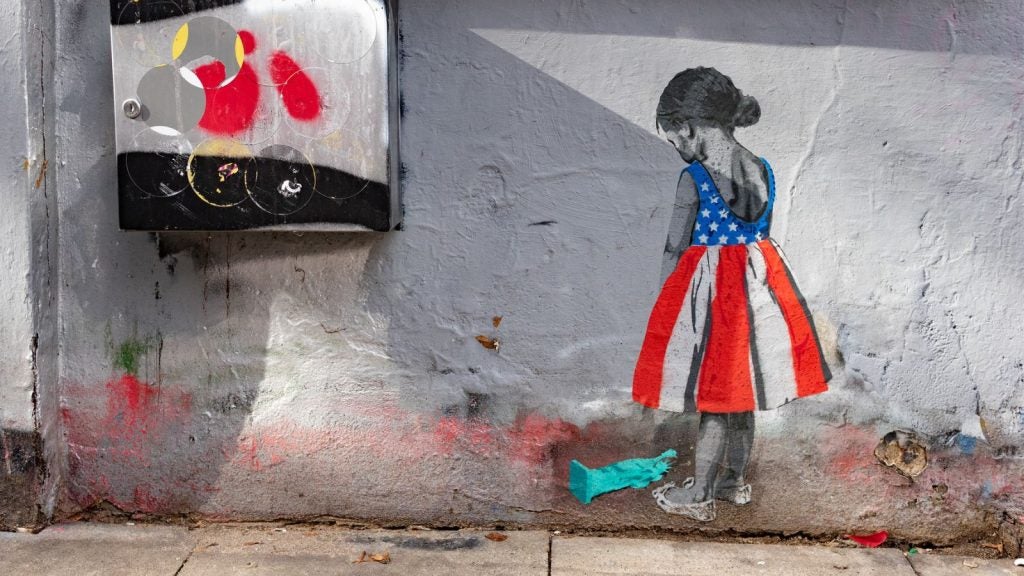For the Fall 2022 special issue of MQR, “Fractured Union: American Democracy on the Brink,” we reached out to a range of esteemed authors to write short essays that respond to Langston Hughes’s poem “Let America Be America Again.”
For more from the special folio, “On Langston Hughes’s ‘Let America Be America Again,’” you can purchase the issue here.
What does it mean to make again itself that which never was? It’s a question that haunts Langston Hughes’s devastating lament, “Let America Be America Again,” in which hope functions more as an indictment than a possibility of the fulfillment of a promise unfulfilled. If we concede it was indeed a promise, we must ask, What was promised? To whom? Was it that all injustice would be redressed by settling elsewhere, on ostensibly virgin territory? Settling? Ourselves and the question of tyranny and persecution—once and . . . for all.
Is America really the idea of exceptional moral opportunity, inadequately and unequally realized? For were the moral and the entrepreneurial not always mingled? Or is it, as is the poem’s subterranean, not entirely subtle, suggestion, that America never was—that “was” . . . both resisting and soliciting an object. Hughes’s challenge, then, is to ask without asking explicitly (perhaps this, too, is the reflexive dilemma) what it is to restore that which never was.
This is very much on my mind these days as diversity and equity have become the new instruments of America’s exceptionalism, and at my own institution, an increasingly troubling poster case for diversity, Muslim students are being marginalized and people like myself made to feel unwelcome by the very representatives of American diversity—the designated shock troops, in other words, of the fulfillment of America’s unrealized promise.
My postcolonial (and postcolonialist) self watches this and feels, viscerally, the repetition of the violence of political decolonization—brimful of the moral certitude of redress and redemption, more likely to consolidate the structures of power (with less possibility of critique and redress) ostensibly being displaced. But then this is America, a smoldering pungent mix of melanin-determined injury, providential entitlement, and imperial exception. Indeed, injury—pioneer and pilgrim—seems to be the fundament of the American exception.
If we are to be more than merely the janissaries of this empire, unable to interrogate its own mythology except through a correction that merely hypostatizes it, we have to change the foundational myth even if we need to balance it to hold the fort (quite literally) against those who seek to breach it—I speak, of course, of Jan. 6—and everything for which it stood.
When a young girl, overdressed in Prada, stands on the podium of an Empire, whose destroyers travel the rising oceans of a destroyed world, whose drones bomb the north of Pakistan, and whose former Black president has said he is particularly morally equipped to decide who gets to be on a kill list, and says “world look at me” and “I am the child of slaves . . .” and we are meant to celebrate that performance as part of the power of America’s capacity for self-correction, we are not in the presence of the realization of a dream deferred but indeed the revelation of the nightmare it always was. So, I say again, if we are to be more than the janissaries of a crumbling empire, we have to reject this exception. To hear the subtle subterranean in Hughes’s words, perhaps upend them in such a way that may even seem a complete rejection, to get beyond the project of American redemption. That is a difficult task today as we struggle to assert historic ideals of democracy and legal accountability and equitable justice, and we need to claim them as foundational, however tenuous and fictional such a claim may be.
And yet to rescue the very possibility of shared sustainable planetary living, we must shift the foundational exceptionalism that makes a young woman think she can address the world that did not vote for her president. Otherwise, we will be doomed to be the unwitting or smug, unwitting and yet smug, providentialist janissaries of an empire that is leaving extraordinary destruction in its dying wake and that, given its exceptional arsenal, is likely to continue to spread destruction, if only in a mercenary role in relation to the rising new-old authoritarian empires, long after it has crumbled.
For more from the Fall 2022 special issue of MQR, “Fractured Union: American Democracy on the Brink,” you can purchase the issue here.






